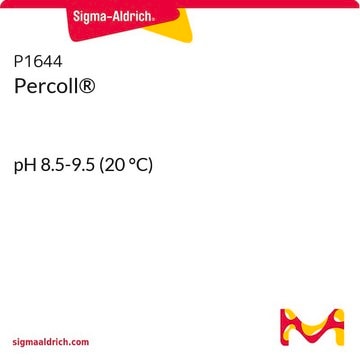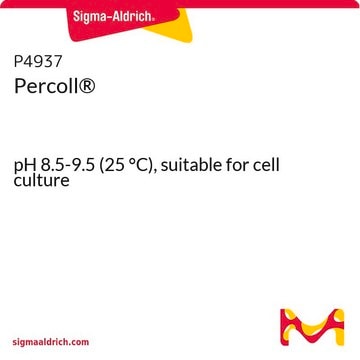D2158
Histodenz™
nonionic density gradient medium
Synonym(s):
5-(N-2,3-Dihydroxypropylacetamido)-2,4,6-triiodo-N,N′-bis(2,3-dihydroxypropyl)isophthalamide
About This Item
Recommended Products
form
powder
application(s)
hematology
histology
storage temp.
room temp
SMILES string
CC(=O)N(CC(O)CO)c1c(I)c(C(=O)NCC(O)CO)c(I)c(C(=O)NCC(O)CO)c1I
InChI
1S/C19H26I3N3O9/c1-8(29)25(4-11(32)7-28)17-15(21)12(18(33)23-2-9(30)5-26)14(20)13(16(17)22)19(34)24-3-10(31)6-27/h9-11,26-28,30-32H,2-7H2,1H3,(H,23,33)(H,24,34)
InChI key
NTHXOOBQLCIOLC-UHFFFAOYSA-N
General description
Application
- It has been used in the isolation and culturing of hepatic stellate cells.
- It has also been employed in the extraction of microbial cells from environmental samples.
- It has been used in LacZ (β-galactosidase) staining.
- It has also been used for the enrichment of gonocytes.
Features and Benefits
- It has very low toxicity, low osmolality, high density, and low viscosity (compared to sucrose).
- It is water-soluble, non-ionic, and chemically near-inert.
Legal Information
Storage Class Code
11 - Combustible Solids
WGK
WGK 1
Flash Point(F)
Not applicable
Flash Point(C)
Not applicable
Personal Protective Equipment
Regulatory Listings
Regulatory Listings are mainly provided for chemical products. Only limited information can be provided here for non-chemical products. No entry means none of the components are listed. It is the user’s obligation to ensure the safe and legal use of the product.
ISHL Indicated Name
Substances Subject to be Indicated Names
ISHL Notified Names
Substances Subject to be Notified Names
JAN Code
D2158-5G:
D2158-VAR:
D2158-BULK:
D2158-25G:
D2158-100G:4548173990507
Certificates of Analysis (COA)
Search for Certificates of Analysis (COA) by entering the products Lot/Batch Number. Lot and Batch Numbers can be found on a product’s label following the words ‘Lot’ or ‘Batch’.
Already Own This Product?
Find documentation for the products that you have recently purchased in the Document Library.
Customers Also Viewed
Articles
Centrifugation enables the separation of particles by sedimentation. Learn how to separate particles using a centrifuge and how to use Stokes' law to calculate the velocity of sedimentation.
Our team of scientists has experience in all areas of research including Life Science, Material Science, Chemical Synthesis, Chromatography, Analytical and many others.
Contact Technical Service









